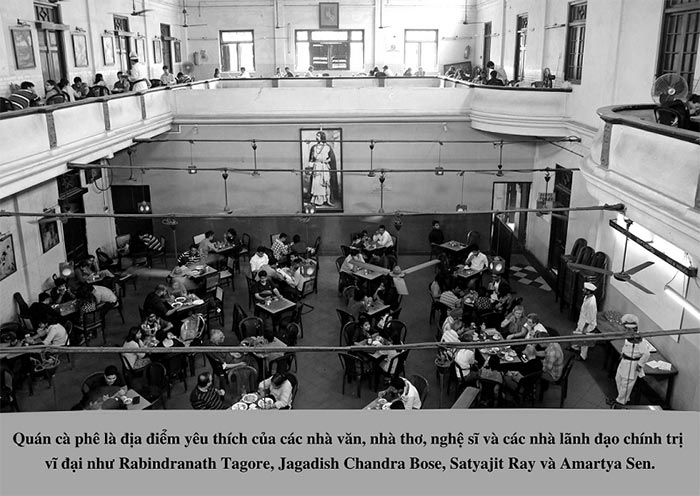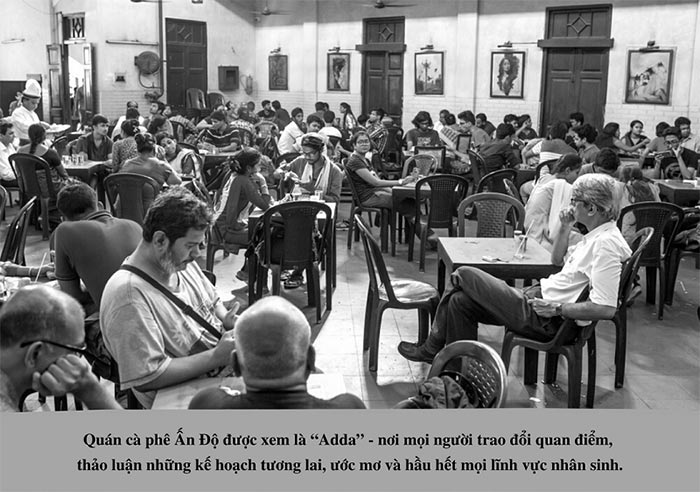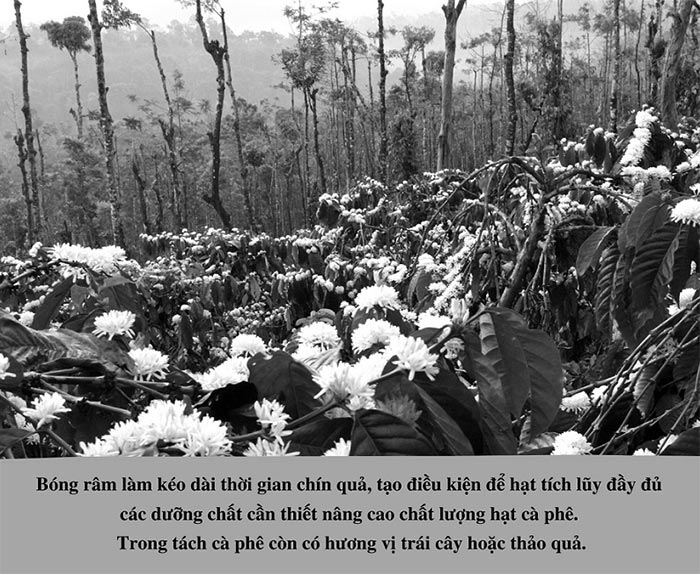Article 58: India – From the 7 wonder seeds to under-shade coffee country

“Coffee which makes the politician wise, and see through all things with his half-shut eyes.” Poet Alexander Pope (1688 – 1744)
From the 7 wonder seeds, India formed a special “under-shade coffee” raw material area, aiming to create an ecosystem to conserve biodiversity and protect the environment.
The 7 wonder seeds
After being discovered in the valleys of Abyssinia (now Ethiopia) in the 9th century, coffee has been revered as a “gift of God”. By the 14th and 15th centuries, Sufi Muslims were convinced that coffee brought awakening energy and had the power to help parishioners generate new ideas. They called this special energy “Marqaha” and enjoyed coffee during the Dhikr ritual that usually took place at midnight.

Baba Budan made efforts to bring coffee seeds from the Muslim holy place to India, he was revered by both Muslims and Hindus.
Coffee quickly spread throughout the Muslim world, including Mecca, Medina and major cities like Cairo, Aleppo, Damascus, Constantinople. In 1475, the first coffee shop was opened in Constantinople (now Istanbul). It wasn’t long before coffee shops appeared throughout the Ottoman Empire, becoming a forum for intellectual discussion and were called “mektab-i-irfan”, meaning “school of knowledge”. During this period, coffee was both a divine drink with religious significance and had a profound influence on secular life. While coffee became the new economic activity, coffee shops played an important role in the process of opening up new civil society institutions. The Ottoman Islamic Empire tried to control and prevent coffee seeds from leaving the territory to keep the monopoly position to enjoy the commercial value of coffee.
In the 17th century, a Sufi Muslim cleric named Baba Budan living in India made a pilgrimage to Mecca. On his journey to receive the blessing, Baba Budan was shared a coffee drink by other Sufi Muslims, and he was amazed at the miraculous awakening energy of this drink. Baba Budan was a wise scholar, he immediately delved deeper into the process of growth, development and how to use coffee. He realized that the Chandragiri hills (in the Western Ghats) in India were suitable land for growing coffee. Baba Budan planned to hide coffee seeds and bring them back to India, bringing blessings from the holy land to his homeland.

The cafe was a favorite spot for great writers, poets, artists and political leaders like Rabindranath Tagore, Jagadish Chandra Bose, Satyajit Ray and Amartya Sen.
Baba Budan chose exactly 7 coffee seeds. The number 7 is a sacred number in the Muslim faith. In the Quran, the number 7 has great symbolic value, directly associated with the divine power such as the 7 heavens, 7 creation periods, 7 walks around the Kaaba (the holiest place of Islam). On the other hand, with Hinduism, the number 7 represents the earth and 7 energies that will awaken during human spiritual practice. Thanks to those sacred meanings, the 7 coffee seeds were approved to be planted on the hillsides of Chandragiri, which is the first origin of the Indian coffee material region. In honor of the missionary, the Chandragiri range – where the 7 coffee seeds sprouted has been named “Baba Budangiri” (Baba Budan Hill). He also received Indian veneration, was canonized, and had a temple right on Baba Budan hill.
Under-shade coffee in harmony with the living environment
By the 19th century, India was the sixth largest coffee producer in the world. The Western Ghats range – a UNESCO World Heritage site – is the most special coffee production area today. Under the endless canopy of primeval forest, coffee trees grow next to the world’s most diverse flora and fauna, supporting biodiversity conservation and minimizing climate change.
Shade limits the phenomenon of photoinhibition, so coffee grown in the shade has a higher photosynthetic efficiency than coffee grown under direct sunlight. It is estimated that one hectare of coffee planted in the shade can absorb and store 70-100 tons of carbon, equivalent to a forest. This helps reduce the concentration of carbon in the atmosphere, contributing to minimizing the greenhouse effect that is directly affecting the earth’s climate change. Besides, most of the Indian coffee plantations are located in the areas with moderate to heavy rainfall, the leaf layer from the coffee trees plays a role of slowing down the runoff and increasing the infiltration of rainwater into the ground, prevent erosion from leaching nutrients in the soil.

Indian cafes are considered “Adda” – where people exchange views, discuss future plans, dreams and almost every aspect of life.
Coffee grown in the shade is a refuge for organisms, forming a symbiotic alliance to protect biodiversity. Scientists from the Wildlife Conservation Society (WCS) surveyed the species diversity in the coffee growing region of the Western Ghats. This study shows that shade-grown coffee provides significant biodiversity benefits and supports the environment for conserving populations of rare and endemic plant and animal species at risk of extinction. Scientists have found about 350 to 400 species living in coffee plantations, of which 79 are dependent, including three species of birds on the Red list: Alexandrine parrot, gray-headed bulbul and Nilgiri wood pigeon.
Wild plants and spices such as piper argyrophyllum miq pepper, cinnamomum malabatrum cinnamon, curcuma neilgherrensis wight turmeric, zingiber capitatum roxb ginger…. are common in coffee plantations. Indian farmers also grow herbs and fruit trees such as oranges, tangerines, cinnamon, cardamom, nutmeg, cloves … interspersed in the coffee farm. This agroforestry system combines coffee with native and imported plants. Therefore, the coffee biosphere greatly affects the surrounding environment. Coffee roots interact with the roots of many different tree species, the secretions from the roots create a rhizospheric microbial environment, establishing a beneficial symbiotic relationship for the forest. While compounds secreted from coffee roots promote the formation and proliferation of higher microbial populations than the rest of the soil, rhizospheric microorganisms are also involved in the production of plant growth hormones by increasing the nutrients in the soil that can be absorbed by plants. They also protect plants from certain pathogens, minimizing the use of fertilizers or the impact of chemical drugs on the habitat of the coffee plantation.

Shade prolongs the ripening time of the fruit, creating conditions for the beans to accumulate all the necessary nutrients to improve the quality of coffee. In the cup of coffee, there are also fruit or cardamom flavors.
The Western Ghats are also a biodiversity hotspot in the world. In a way, the shade coffee plantation system closely interacts with the biotic and abiotic environments that function as an ecoregion and act as a biodiversity conservation area. Coffee growers are also well aware of the issues of management, conservation and sustainable development of the country’s coffee forests. More than 90% of the coffee area is surrounded by national parks and wildlife sanctuaries. Coffee Board of India, India Coffee Trust join hands to control and promote sustainable agriculture practices, promote the shade grown coffee with the aim of improving awareness about preserving and promoting the values of coffee trees.
Climate change has been causing negative impacts on people’s lives in all fields. Currently, coffee material regions around the world, including Vietnam, have adopted an agroforestry system because of its important role in supporting biodiversity and mitigating disasters caused by climate change. Efforts to develop a sustainable coffee industry globally is a form of humanity, working together to create the concept of responsible living, people mutually agree and live in harmony with the environment, not exploiting the environment, or going against nature.
Natural agroforestry is part of the huge legacy of Indian civilization. Indian agro-forestry has originally been influenced by religion, philosophy to science and technology… This creates a different identity not to be confused with other countries. In his work “The Story of Civilization – India”, historian Will Durant documented efforts to domesticate crops from the dawn of the Indus Valley Civilization (2,800 – 1,800 BC) to the global agricultural culture during the golden age of Gupta (319 – 467) turning India into one of the most brilliant civilizations of mankind. Until now, plants and animals have always been worshiped by the Indians in religious rituals. The work “The Story of Civilization – India” is also one of the 100 precious books in the “Life Changing Fundamental Bookcase” which was carefully selected by the Founder – Chairman of Trung Nguyen Legend Group Dang Le Nguyen Vu in order to encourage the learning, absorption and application of the quintessence of human knowledge, thereby rising to match the potential of the Vietnamese national intelligence, creating prosperity and strength for the nation.
THE REAL COFFEE
ROASTED ONLY FOR PEOPLE OF WISDOM!
Source: “The Philosophical Way of Coffee” – copyright by Trung Nguyen Legend


